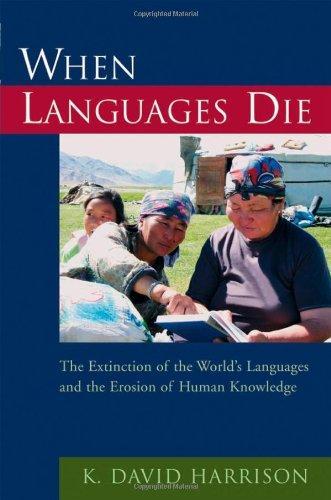An Interesting If Disorganized Book on an Important Topic
3 stars
As languages are going extinct at an unprecedented rate with the rapidly increasing population in urban centers and the subsequent economic benefits of speaking major languages, understanding what is being lost is especially urgent. This book nicely sketches out the issues here: loss of cultural knowledge, loss of natural world knowledge, and loss of evidence essential for understanding human cognition. I wish there was much more exploration of the tradeoffs that populations are making as they choose (or are forced to choose) more dominant languages. Harrison focuses almost exclusively on what knowledge is lost, but doesn't explore what these populations gain (presumably greater income, social mobility, and lifespan). Without understanding that causal aspect of language extinction mechanisms, it seems extremely difficult to slow down or reverse this issue.
Perhaps more problematically, this Harrison seems to decry demonstrable improvements in health and income of populations that make active choices to embrace …
As languages are going extinct at an unprecedented rate with the rapidly increasing population in urban centers and the subsequent economic benefits of speaking major languages, understanding what is being lost is especially urgent. This book nicely sketches out the issues here: loss of cultural knowledge, loss of natural world knowledge, and loss of evidence essential for understanding human cognition. I wish there was much more exploration of the tradeoffs that populations are making as they choose (or are forced to choose) more dominant languages. Harrison focuses almost exclusively on what knowledge is lost, but doesn't explore what these populations gain (presumably greater income, social mobility, and lifespan). Without understanding that causal aspect of language extinction mechanisms, it seems extremely difficult to slow down or reverse this issue.
Perhaps more problematically, this Harrison seems to decry demonstrable improvements in health and income of populations that make active choices to embrace outside technologies/languages. A historical view would be extremely helpful here - did historic populations that switched to a major language experience improvements in outcomes? When they didn't, why? What aspects of language and the extinction process were related to those outcomes? None of these questions are asked or answered here.
Still, there's lots of extremely interesting exploration of unique and endangered languages here, as well as fascinating information on global language distribution.

